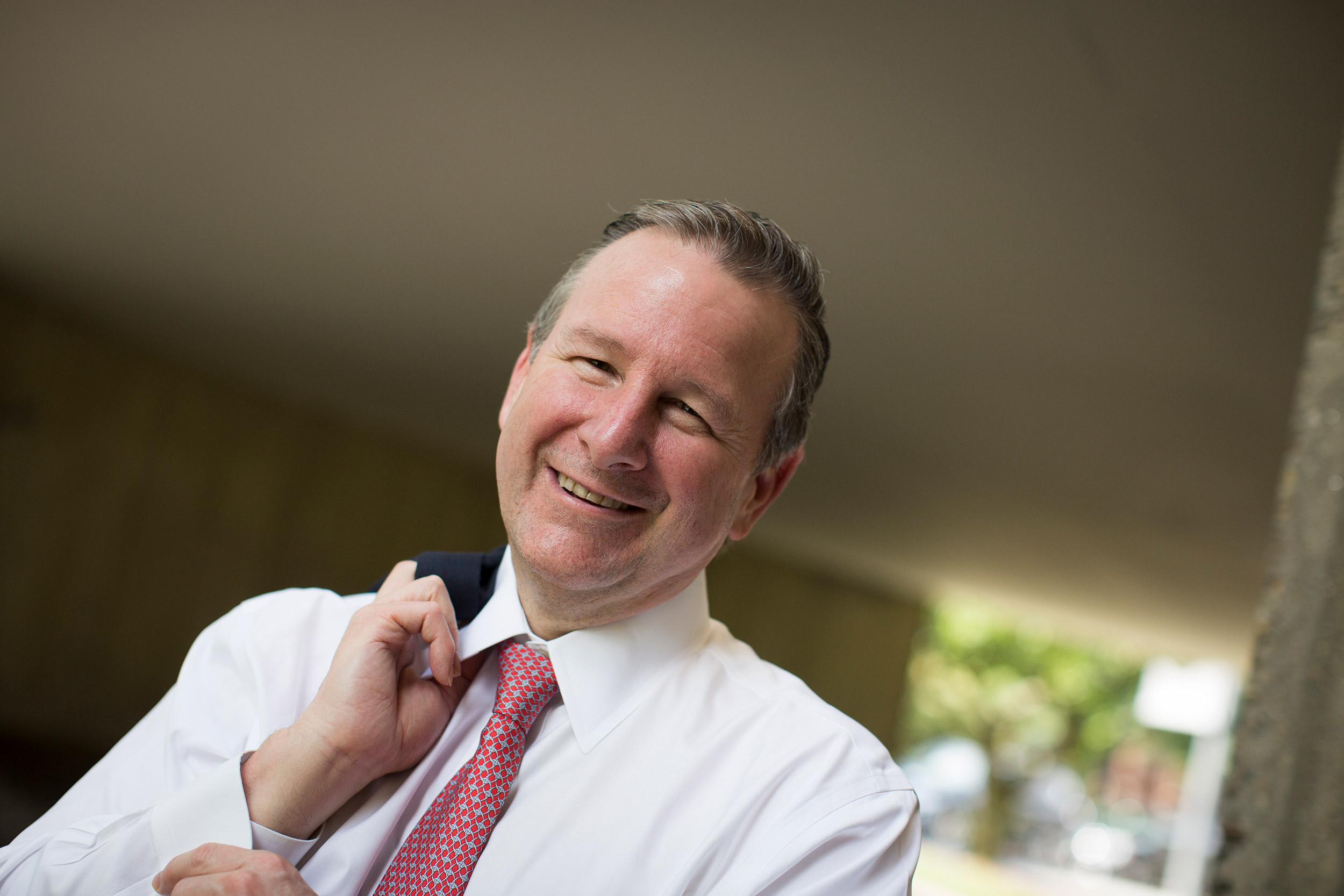
Vice Provost for Research Rick McCullough will begin his post as president of Florida State University on Aug. 16.
Stephanie Mitchell/Harvard file photo
Vice Provost Rick McCullough to become Florida State president
Fostered robust partnerships and helped boost Harvard’s research output
Vice Provost for Research Rick McCullough, who fostered strong partnerships and helped grow the University’s research output over his near decade in the role, has been named president of Florida State University (FSU). McCullough was unanimously selected by the FSU’s Board of Trustees in May and by the system’s Board of Governors on Wednesday.
“Rick is a consummate problem-solver,” said Provost Alan M. Garber. “He has used his formidable analytic and people skills to bring people together to tackle major challenges, from COVID to research computing to climate change. And his influence extends beyond Harvard to the broader Massachusetts research ecosystem and to the nation. By developing trusted partnerships and adopting a ‘let’s get this done,’ solutions-oriented approach, Rick has been consistently successful. Harvard has been truly fortunate to benefit from Rick’s leadership, and we take great pride in his appointment at FSU.”
In his time as vice provost, McCullough demonstrated a talent for bringing like-minded people together on initiatives that extended far beyond Harvard’s campus. He was, for instance, instrumental in the establishment of a unique public-private partnership, the Center for Advanced Biological Innovation and Manufacturing. This large-scale, $100 million biological innovation facility will serve as a hub for medical research and education, as well as for economic and workforce development, for years to come.
McCullough also served as president of the Massachusetts Green High Performance Computing Center, a state-of-the-art, high-performance, and energy-efficient computing collaboration that helped Harvard and other area colleges and universities gain faster access to vast amounts of data.
At Harvard, McCullough led progress across a number of areas related to research, including strategic planning efforts to develop and grow the Harvard Quantum Initiative; the launch of a new, $40 million structural biology program and cryo-electron microscope facility that created partnerships between Harvard Medical School and three Greater Boston hospitals; and the development of the Harvard Climate Change Initiative Plan, which furthered the University’s commitment to climate scholarship and policy. McCullough also ushered in significant gains in research investment during his tenure: Over the past nine years the University saw an increase of just under 50 percent in corporate funding and over 100 percent in foundation support. Harvard’s research funding rank, according to the National Science Foundation, rose from No. 18 to No. 9 nationwide.
McCullough also led the planning, launch, and growth of Harvard’s Data Science Initiative (HDSI) — a collaboration involving more than 120 faculty members that resulted in the creation of three new master’s programs, new undergraduate courses, a new competitive research fund related to data science, and a prestigious postdoctoral fellowship program.
“Rick is a visionary leader, and he has been instrumental in the successful launch of the HDSI,” said Francesca Dominici, the initiative’s faculty co-director. “He has a unique ability to understand which opportunities to pursue and the skill to bring academia and industry together when synergies exist.”
Over the course of the COVID-19 pandemic, McCullough faced unprecedented challenges with a collaborative spirit, chairing the University’s Lab Reopening Planning Committee, made up of about 25 experts from area schools and hospitals; co-authoring, with FAS Dean of Science Christopher Stubbs and chief research compliance officer Ara Tahmassian, the University’s research laboratory re-entry plan; and leading a coordinated effort with Greater Boston institutions of higher education to brief the state’s advisory board on recommendations for safely reopening labs.
“Rick expertly organized the research enterprise across Harvard in the past year as people gingerly came back into research laboratories during the COVID pandemic,” Stubbs said. “And his coordination across the Harvard hospitals, the Medical Schools, School of Public Health, the Dental School, the Engineering School, and the Faculty of Arts and Sciences was really quite masterful. He helped us draw upon the experience in the hospitals, to craft a safety and implementation plan that struck an excellent balance between empowering people to do their work, and maintaining a safe workplace.”
Sarah Fortune, the John LaPorte Given Professor of Immunology and Infectious Diseases and chair of the Department of Immunology and Infectious Diseases at the T.H. Chan School of Public Health, also worked closely with McCullough over the course of the pandemic.
“Rick has been an incredible advocate for the research community at Harvard and a bridge-builder during a very difficult time,” said Fortune, who is also director of the TB Research Program at the Ragon Institute of MGH, Harvard, and MIT. “He has also been a great personal mentor to me. I’ve only been in my current role for a year, and I know that, in that short time, I’ve become a better department chair thanks to his guidance.”
Prior to his time at Harvard, where he was also professor of materials science and engineering, McCullough served as vice president for research at Carnegie Mellon University in Pittsburgh, where he had previously been dean of the Mellon College of Science, and Lord Professor and head of the department of chemistry. He earned his B.S. in chemistry from the University of Texas, Dallas; his M.A. and Ph.D. in chemistry from Johns Hopkins University in Baltimore; and completed a postdoctoral fellowship at Columbia University in New York. He begins his post at FSU on Aug. 16.
“Rick has tremendous empathy,” said Stubbs, “and he understands the mission of institutions almost instinctively. His collaborative style will serve him well at FSU.”




